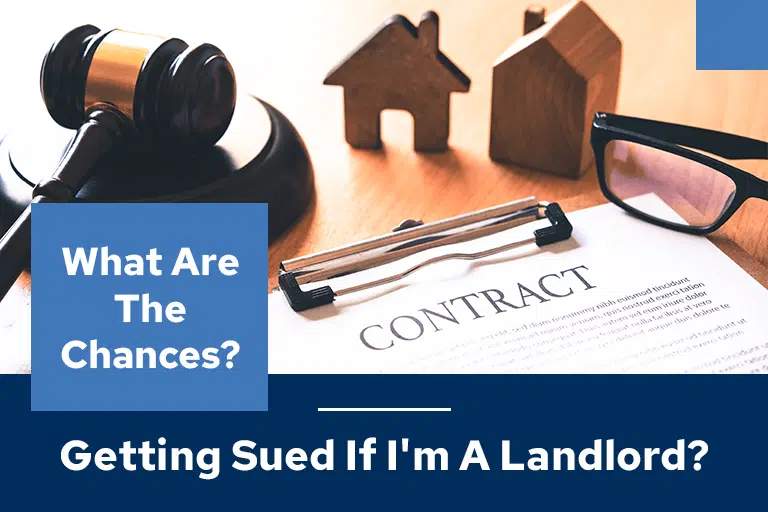
What Are The Chances of Getting Sued If I’m A Landlord
For landlords that own rental properties, there’s always a chance that you’ll find yourself in a lawsuit. While not as common as one might think, there are a number of situations that can escalate into a lawsuit if the right precautions, laws, and responsibilities aren’t followed to mitigate the risk. In most cases, lawsuits are brought forth by tenants as a last resort after several attempts have been made to resolve the pending conflict. Let’s take a look at the most common landlord-tenant issues that can lead to you being sued.
1. Illegally Keeping the Security Deposit.
Each state has a landlord-tenant law that lists out the specific types of deductions that you can take from the security deposit. However, you cannot keep the security deposit in full without providing an itemized list of damages and cost of repairs to the tenant. If you make a deduction that is illegal, or was not agreed to in advance, such as wear and tear, then you can be taken to court. In addition to this, a lawsuit can be brought against you if you simply do not return the security deposit, or you withhold it falsely. If the tenant wins in this type of lawsuit, you’ll be expected to return the security deposit, plus interest and any accrued legal fees.
2. Violating the Federal Fair Housing Act.
You cannot discriminate against tenants based on race, color, religion, sex, or national origin. You must also make reasonable accommodations for disabled tenants and comply with all other regulations outlined in the Fair Housing Act.
3. Including Illegal Clauses in the Lease Agreement.
You cannot insert any clauses into the lease agreement that violate the local, state, or federal laws and regulations, including anything that is deemed to be morally unfair. For instance, you cannot put in clauses that refuse service animals, force the tenant to move in or out at your own discretion, or a clause that states that you’re not responsible for making unit repairs.
4. Failure to Reimburse a Repair Cost.
If you refuse to pay for repairs in a reasonable amount of time, and the tenant gets someone else to perform the repair, they can sue you to recover the money they spent out of pocket for the repair. It is critical to always make repairs to the property as per the law of your local state. This includes repairs to appliances, fixtures, and heating or air conditioning units.
5. Refusal to Provide a Habitable Unit (Essential Services).
You are obligated to provide habitable dwelling units to tenants. This means that all the unit’s systems need to be functional, including the plumbing, heating, ventilation, air conditioning, and electricity. If a tenant is forced to live in an uninhabitable unit because you have failed to make the necessary repairs or provide essential services like water or heat during winter months (or air conditioning during summer months), the tenant can sue for damages.
6. Failure to Disclose Existing Hazards to Prospective Tenants.
You are required to disclose any known, pre-existing, or previous hazards that pose risk to the tenants. This includes previous lead paint hazards, or mold issues within the property. Failure to notify the tenants of this can result in you being held accountable for damages incurred from injuries or illnesses directly related to these hazards. To purposely hide this type of information from a tenant is grounds for a lawsuit, as hazards like these pose long-term health risks.
7. Not Providing Reasonable Notice to Enter a Unit.
You cannot enter a tenant’s unit without giving them proper notice of needed entry. This includes a 24-hour advance notice for emergency repairs, and typically 48-hours for other reasons. If you enter a tenant’s unit without following the proper procedures, they can sue you for violating their privacy rights.
8. Building Neglect Leading to Tenant Injury.
A lawsuit case can be built against you if it is found that property negligence has caused a tenant to become injured. For example, if common areas in a building are not safe and free from hazards, or the necessary repairs to maintain the property are not completed, and a tenant is injured as a result, they can sue you for damages. You cannot be held responsible if a tenant’s own unit neglect has caused them to become injured (not cleaning their apartment and falling as a result).
9. Wrongful Eviction of a Tenant.
Landlords cannot evict tenants without following the correct legal procedures, which include providing proper notice and going through the appropriate channels. If you try to evict a tenant illegally, they can fight back by suing you for wrongful eviction. This will result in not only the tenant being allowed to stay in the property, but you’ll also likely have to pay their legal fees and damages.
As you can see, there are many ways in which a landlord can be subject to lawsuit. By being aware of the most common landlord-tenant issues, you can take the necessary precautions to help reduce your chances of being sued. For more information on Florida landlord-tenant law, you can visit the Florida Bar, or the FDACS site. If you require clarification on any of the landlord-tenant laws, please contact us online, or give us a call at (877) 589-3591.


